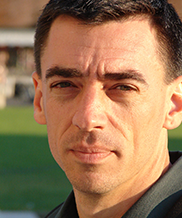The Science of Remembering
Anthony Wagner, The Science of Remembering. The ability to remember the past is critical for many aspects of human behavior, from day-to-day behaviors, such as remembering to take medications or recognizing previously encountered people, to other complex behaviors, such as navigating to spatial goals. Wagner will describe how memory is central to who we are and how we behave, discussing new insights into how memory is organized and supported by the mind and brain. His talk will emphasize how recent advances in functional brain imaging, when combined with virtual reality paradigms and machine learning analytic techniques, can provide an unprecedented window onto how the brain supports memory-guided thinking and action.
 Anthony Wagner is a Professor of Psychology and Neuroscience at Stanford, where he directs the Stanford Memory Laboratory (http://memorylab.stanford.edu) and co-directs the Stanford Center for Cognitive and Neurobiological Imaging (http://cni.stanford.edu). His research focuses on the psychology and neuroscience of learning, memory, and executive function in young and older adults. His lab uses a variety of imaging techniques, including functional MRI and electroencephalography, to understand how the brain builds and retrieves memories and to examine the processes that enable goal-directed behavior. He received his Ph.D. in Psychology and Cognitive Neuroscience from Stanford in 1997. In addition to his basic science, he examines the interactions between media use and neurocognitive function, and explores the implications of neuroscience for the law as a member of the MacArthur Foundation’s Research Network on Law and Neuroscience.
Anthony Wagner is a Professor of Psychology and Neuroscience at Stanford, where he directs the Stanford Memory Laboratory (http://memorylab.stanford.edu) and co-directs the Stanford Center for Cognitive and Neurobiological Imaging (http://cni.stanford.edu). His research focuses on the psychology and neuroscience of learning, memory, and executive function in young and older adults. His lab uses a variety of imaging techniques, including functional MRI and electroencephalography, to understand how the brain builds and retrieves memories and to examine the processes that enable goal-directed behavior. He received his Ph.D. in Psychology and Cognitive Neuroscience from Stanford in 1997. In addition to his basic science, he examines the interactions between media use and neurocognitive function, and explores the implications of neuroscience for the law as a member of the MacArthur Foundation’s Research Network on Law and Neuroscience.